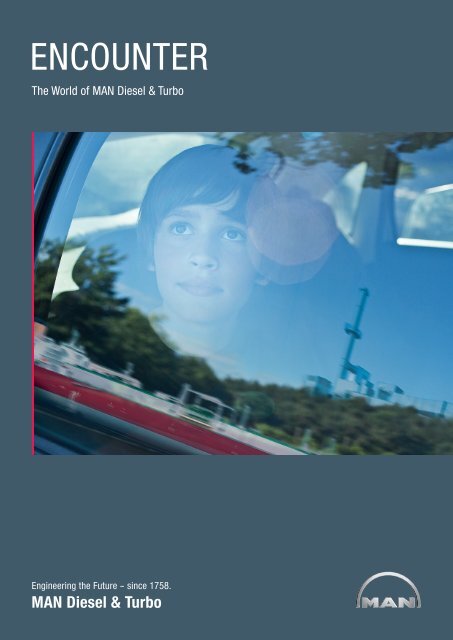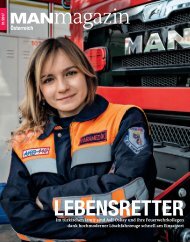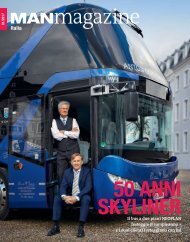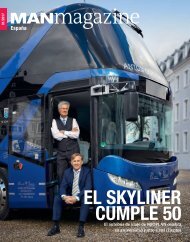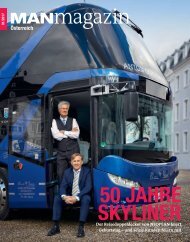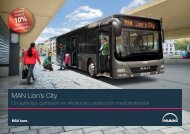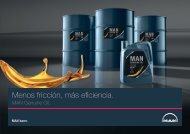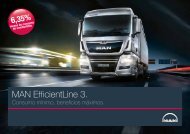MDT Image Magazine
The MAN Diesel and Turbo image magazine "ENCOUNTER" in English
The MAN Diesel and Turbo image magazine "ENCOUNTER" in English
Create successful ePaper yourself
Turn your PDF publications into a flip-book with our unique Google optimized e-Paper software.
ENCOUNTER<br />
The World of MAN Diesel & Turbo
Contents<br />
Editorial 5<br />
6<br />
<strong>Magazine</strong><br />
Power Plants 6<br />
Turbomachinery 14<br />
Marine Engines & Systems 22<br />
MAN PrimeServ 30<br />
14<br />
Gas – a bridge to the future 38<br />
Products and Services 40<br />
At a glance 42<br />
22<br />
Imprint 43<br />
30<br />
Encounter 3
Executive and<br />
Supervisory Board<br />
Dr Georg Pachta-Reyhofen<br />
Chairman of the Supervisory Board of MAN Diesel & Turbo SE,<br />
Chief Executive Officer of MAN SE<br />
Dr Hans-O. Jeske<br />
Frank Burnautzki<br />
Arnd Löttgen<br />
Dr Peter Park<br />
Chief Technology Officer,<br />
Chief Procurement<br />
Chief Manufacturing<br />
Chief Financial Officer<br />
Turbomachinery<br />
Officer<br />
Officer, Engines,<br />
Power Plants<br />
Wilfried von Rath<br />
Dr Stephan Timmermann<br />
Chief Human Resources<br />
Marine Systems,<br />
Officer<br />
After Sales<br />
4 Encounter
Editorial<br />
Dear Readers,<br />
each of the many and diverse projects that we<br />
accomplish with our customers is fascinating in<br />
its own right. Whether it relates to commercial<br />
shipping, the oil and gas industry, the production<br />
of basic materials or cement, cruise liners or<br />
decentralized power generation, every project has<br />
its own intriguing story. It tells of technological<br />
expertise, of convinced customers and not least<br />
of the deployment of our workforce numbering<br />
over 14,000 people.<br />
Just recently we have realized a wide variety of<br />
projects that demonstrate the trust that our<br />
customers worldwide put in our ability to solve<br />
even the most difficult problems: floating power<br />
plants that supply energy where it is urgently<br />
needed. Efficient drives for the world’s biggest<br />
ships, which are also the cleanest thanks to our<br />
technology. A 24/7 service capability thanks to<br />
specialists working day and night for our customers<br />
across the globe. Dedication leading to longterm<br />
partnerships, such as with the customer<br />
who has been won over repeatedly for more than<br />
20 years by our innovative turbomachinery.<br />
Our work is characterized by the needs of a globalized<br />
world with a growing population and its demand<br />
for more energy, increasing trade and rising<br />
production, paralleled by the quest for improved<br />
resource efficiency. Whether as a supplier of marine<br />
engines or complete power plants, turbochargers,<br />
compressors, chemical reactors or turbines,<br />
MAN Diesel & Turbo makes an important<br />
contribution to all of these. How we do it is what<br />
we want to show you in this magazine, with reference<br />
to a few examples.<br />
I hope you find it an interesting read.<br />
Yours truly<br />
Dr Jan Dietrich Müller<br />
Vice President<br />
Group Communications & Marketing<br />
MAN Diesel & Turbo SE<br />
Encounter 5
Power Plants<br />
Hungry<br />
for power<br />
The global demand for electrical energy will<br />
rise by around 40 percent by the year 2035. A large<br />
part of this energy will be generated decentrally.<br />
6 Encounter
Decentralized energy generation is especially important in newly<br />
industrializing countries, where electrical power is the economic driver<br />
and must be supplied quickly and reliably, regardless of the extent and<br />
condition of the electricity grids. It is important to industrial companies<br />
worldwide that cover their energy requirements with their own power<br />
plants, and for supplying remote areas and islands far removed from<br />
any power infrastructure.<br />
Decentralized energy can compensate for the variations in the supply of<br />
electricity generated from renewable resources, ensure an uninterrupted<br />
supply of power to energy-intensive processes and stabilize the growth<br />
dynamics of booming “megacities”.<br />
Whether powered by diesel distillates, biofuel or natural gas, MAN engines<br />
operate with a high level of efficiency in all time and climate zones on<br />
the planet to ensure that people and companies can reliably utilize the<br />
electrical energy that underpins progress.<br />
Encounter 7
Power Plants<br />
Africa – like here<br />
in Nairobi, expansion<br />
of the economy is<br />
accompanied by a rising<br />
energy demand.<br />
Continent of opportunities<br />
As the second-largest continent, Africa is home to over a billion people – with a fast-growing<br />
economy and a rising energy demand.<br />
It is predicted that many African states will<br />
generate important growth stimuli for the<br />
global economy in the future. The need to<br />
catch up with the rest of the world is huge, especially<br />
in the energy sector: the International<br />
Energy Agency (IEA) estimates African electricity<br />
consumption at 500 kWh per capita, equivalent to<br />
a fifth of the global average.<br />
Africa is already by now a strong sales market for<br />
MAN Diesel & Turbo. In 2013 alone, the company<br />
received orders for power plants to the value of<br />
over 100 million euros. The first MAN gas power<br />
plant in Africa was handed over to a customer in<br />
Gabon. The plant’s generators are driven by four<br />
51/60DF engines operating in gas mode.<br />
Another technological debut will be achieved<br />
on the continent in the course of 2014 when the<br />
first diesel combined cycle power plant from<br />
MAN on the African continent is transferred to<br />
the client. At the plant in Thika, Kenya, five<br />
18V48/60 engines and one MAN MARC 2 steam<br />
turbine will deliver 88 MW of electrical power.<br />
The steam turbine uses the exhaust heat of the<br />
engines to generate 6.8 MW, equivalent to nine<br />
percent more electrical energy, from the same<br />
quantity of fuel.<br />
8 Encounter
Diesel power plants are ideal to reliably serve even remote or slightly developed areas such as islands with electricity.<br />
As in the rest of the world, the importance of natural<br />
gas as a commodity will increase further in<br />
Africa too. The north in particular has plentiful<br />
reserves and the distribution infrastructure is<br />
growing. Large gas deposits also exist in the south<br />
of Nigeria, while further deposits are being explored<br />
or have already been tapped on parts of the<br />
east and west coast. “The customer potential for<br />
our gas and dual fuel engines in Africa is growing<br />
in parallel with the expansion of the transport<br />
infrastructure,” explains Hans-Jürgen Wio, Head<br />
of the Power Plants Business Unit. “For regions<br />
without suitable links and particularly remote regions<br />
in which mine operators are often active, for<br />
example, HFO engines (heavy fuel oil) are a better<br />
option.”<br />
As the business grows, so the company’s local<br />
presence is also increasing. In addition to sites in<br />
South Africa, Kenya and Senegal, the sales network<br />
is being developed further. Plans are in hand to<br />
open a sales office in Nigeria this year. “With an<br />
estimated number of 160 million inhabitants and<br />
a growing middle class, the need for power is constantly<br />
increasing in Nigeria. While the south of<br />
the country is rich in gas and therefore a promising<br />
market for gas engines in the future, the north<br />
tends to prefer power generation based on HFO,”<br />
says Dr Markus Ostermeier, an expert on Africa<br />
in the Business Development department of the<br />
Power Plants Business Unit.<br />
Apart from its own organization, MAN is also exploiting<br />
further inroads into the African market.<br />
“We are working with various EPC partners (engineering,<br />
procurement, construction) on the continent.<br />
Many globally active EPCs are already superbly<br />
positioned in Africa,” says Hans-Jürgen Wio.<br />
Encounter 9
Power Plants<br />
The Power of Friendship<br />
Floating power plants supply electricity to Lebanon.<br />
Floating power plants –<br />
here in the form of specially<br />
built power barges or as<br />
reconstructed ships with<br />
their own propulsion<br />
MAN Diesel & Turbo and the Turkish energy<br />
company Karadeniz are working<br />
together to create floating power<br />
plants. They are converting decommissioned bulk<br />
carriers, heavy lift vessels and barges into mobile<br />
power plants or so-called “power ships”. These can<br />
be deployed at sea to deliver electricity to places<br />
where it is urgently needed.<br />
Power ships are not a new idea: they were first<br />
used back in the 1930s. Then, as now, their primary<br />
purpose was to restore the power supply<br />
following natural disasters or in emergency situations.<br />
Power ships also help to bridge capacity<br />
bottlenecks in the electricity supply, for instance<br />
in regions where the infrastructure is poorly developed.<br />
Karadeniz is the only company in the world to<br />
operate an entire fleet of power ships and extend<br />
it further. The ships have generating capacities<br />
of between 45 and 500 MW. In the medium term,<br />
the overall capacity of the fleet is expected to<br />
increase to around 2 GW.<br />
The floating power plants are operating as part of<br />
the Karadeniz initiative “The Power of Friendship”<br />
and are intended to offer a seaborne remedy to<br />
the urgent power supply problems in countries of<br />
the Middle East, Africa and Asia. The fleet is expected<br />
to be deployed to 15 different countries.<br />
The two latest examples are currently moored in<br />
Lebanon, stabilizing the power supply to the capital<br />
Beirut. Since spring 2013 the “Karadeniz Power<br />
Ship 9”, the Fatmagül Sultan with a capacity of approx.<br />
180 MW, has been feeding electricity into<br />
Beirut’s power grid. It is fired by eleven 18-cylinder<br />
V51/60 dual fuel engines from MAN Diesel & Turbo<br />
that can be operated using either heavy fuel oil<br />
or gas.<br />
The tenth power ship, the Orhan Bey, was deployed<br />
last summer to boost the supply, anchoring<br />
off the Jiyyeh power plant operated by the<br />
Lebanese state electricity enterprise “Électricité<br />
du Liban”. The Orhan Bey is also equipped with<br />
MAN 18V51/60DF engines, making available a<br />
further 120 MW for the grid.<br />
10 Encounter
Both installations were conceived as so-called<br />
power barges. The power plants are not installed<br />
on vessels with their own drive, but on floating<br />
platforms or “barges” and are towed to their destinations.<br />
“The power barge configuration offers the<br />
option of higher generating capacities, because<br />
we don‘t have to take existing superstructures<br />
into account,” explains Hans-Jürgen Wio, who is<br />
heading the Power Plants business unit.<br />
“The concept of the Karadeniz power ships can<br />
make an important contribution to improving the<br />
electricity supply of regions with poor infrastructure<br />
and thus also their economic development<br />
in the medium term. The mobile power plants<br />
provide power quickly and reliably to places where<br />
it is urgently required and thus contribute directly<br />
to improving the living conditions locally,”<br />
says Wio.<br />
The gas engine growth market<br />
Interview with Hans-Jürgen Wio, Senior Vice President and Head of the Power Plants<br />
business unit at MAN Diesel & Turbo<br />
For efficient<br />
generation of power<br />
and heat, natural gas<br />
is ideally suited.<br />
Mr. Wio, gas seems to have been the all-dominant<br />
topic in the power plant sector for some time.<br />
Why is that so?<br />
The whole world is experiencing a natural gas<br />
boom that is fuelled to a significant extent by<br />
growing global reserves and new exploration and<br />
production techniques. The “Golden Age of Gas”<br />
has dawned, according to the International Energy<br />
Agency. This trend does not exclude decentralized<br />
power generation using medium-speed engines;<br />
natural gas has now become one of the main energy<br />
sources in this market segment too. In 2012,<br />
the global market for gas and dual fuel engines<br />
was bigger than that for diesel/HFO engines for<br />
the first time. The market for gas engines is also a<br />
key growth market for us.<br />
What are the main drivers for this market growth?<br />
The fuel must be available. In the case of natural<br />
gas, this means that a suitable pipeline network<br />
must exist. As the worldwide production volume<br />
increases and LNG (liquefied natural gas), which is<br />
transported by sea, becomes more important<br />
and available, these networks are being expanded<br />
increasingly even in emerging countries. The<br />
market for gas engine power plants is growing<br />
with the infrastructure. On the other hand, the<br />
advances made in exploration and production<br />
technology mean that even smaller gas deposits<br />
can be opened up profitably. These can then be<br />
exploited for power and heat production directly<br />
at the gas source, as in many parts of Russia,<br />
for example.<br />
Encounter 11
Power Plants<br />
Markets for gas and dual<br />
fuel engines are growing<br />
worldwide.<br />
Is MAN Diesel & Turbo ready for the “Golden Age<br />
of Gas” in terms of products?<br />
There is a long tradition of gas technology at MAN.<br />
Our dual fuel engines have been offering our customers<br />
complete flexibility in the choice of fuel<br />
for many years. With our 35/44G engine we have<br />
also positioned what is currently the most productive<br />
pure gas engine of its capacity class in the<br />
market. This forms the heart of the gas power<br />
plant that we are currently constructing for VW in<br />
Braunschweig. We will expand this segment into<br />
the 20 megawatt class from the end of 2014 with<br />
the 51/60G. We are thus ideally positioned to service<br />
the growing market segment for gas engine<br />
power plants with an output of over 100 megawatts.<br />
The gas engines are part of the BLUEFIRE portfolio,<br />
is that correct?<br />
Correct, we have been presenting the integrated<br />
natural gas portfolio of MAN Diesel & Turbo as<br />
part of the global BLUEFIRE campaign since 2012.<br />
With our technologies we are a valuable partner<br />
and supplier at virtually all stages of the natural<br />
gas value creation chain, from production via<br />
transport and energy recovery to storage. It is important<br />
that our customers, who now seek complete<br />
solutions instead of single products to an<br />
increasing extent, are aware of that.<br />
Why is that?<br />
It is all to do with the changing structures in global<br />
markets. Power plant orders are part of a global<br />
project business. Many investors have no direct<br />
reference to the energy sector and are therefore<br />
looking not for single components, but for complete<br />
solutions for providing electricity and/or<br />
heat efficiently.<br />
Can MAN Diesel & Turbo service this trend?<br />
We are a manufacturer of high-quality, worldleading<br />
power generation engineering and a reliable<br />
partner and competent contact for our customers,<br />
from component to complete solution.<br />
Our EPC competence and EPC readiness, even for<br />
larger power plants, are skills that are key to our<br />
competitiveness. Together with the customer we<br />
thus find a solution to virtually any challenge.<br />
A reliable power supply for Saudi Arabia’s<br />
cement industry<br />
MAN Diesel & Turbo is building a complete diesel power plant for Saudi Arabia’s United<br />
Cement Industrial Company.<br />
Roughly 160 km south of Jeddah, Saudi<br />
Arabia’s most important Red Sea port, the<br />
Saudi United Cement Industrial Company<br />
(UCIC) is constructing a new cement works capable<br />
of producing around 5,000 tonnes of cement a<br />
day. Lime and clay, the raw materials used in cement<br />
production, are extracted nearby in the<br />
middle of the Saudi Arabian desert. The power for<br />
the new cement works will be supplied by five<br />
MAN 20V32/44CR engines. UCIC has commissioned<br />
MAN Diesel & Turbo to construct a complete<br />
power plant for the cement works in its capacity<br />
as an EPC (Engineering, Procurement, and<br />
Construction) supplier. As well as supplying the<br />
12 Encounter
Power plant with<br />
Motor Combined Cycle.<br />
The company also has the<br />
right products available<br />
for utilizing waste heat.<br />
engines, MAN is thus responsible for constructing<br />
all the necessary ancillary installations, from the<br />
machine hall and the cooling system to the processing<br />
and disposal system. A consortium partner<br />
handles the local deliveries and services.<br />
UCIC’s new cement works is being built in a very<br />
hot, sandy region in which temperatures in summer<br />
can hit 50 degrees Celsius. The reliability of<br />
the MAN engines when operating under such extreme<br />
conditions was a decisive purchasing criterion.<br />
The design of the plant is also being optimized<br />
with regard to the climatic conditions.<br />
“Saudi Arabia is a key market for our power plant<br />
division and we have extensive experience there,”<br />
says Alexander Stöckler, Head of Sales for the<br />
MENA region in the Power Plants business unit of<br />
MAN Diesel & Turbo. “We see great potential above<br />
all in the field of decentralized power plant solutions<br />
for independent power generation, for example<br />
for cement works or steel plants.”<br />
Cement is the most commonly used material of<br />
all, with global production running at 2.8 billion<br />
tonnes, and Saudi Arabia is one of the 20 biggest<br />
cement manufacturers in the world. Saudi Arabia’s<br />
requirement for cement will increase in the<br />
medium term, as the country’s development<br />
plans envisage a host of construction and infrastructure<br />
projects.<br />
Five MAN engines take<br />
care of a reliable power<br />
supply in the Arabian<br />
desert.<br />
Encounter 13
Turbomachinery<br />
Elementary<br />
parts<br />
Whether in production or power generation,<br />
turbomachines are indispensable components.<br />
14 Encounter
The car you use to drive to work and the fuel in its tank, the clothes you wear,<br />
and the paper in your printer – almost every product you use comes into<br />
contact with turbomachinery at some time in the manufacturing process. And<br />
the chances are that the machine in question carries the MAN Diesel & Turbo<br />
logo. They are seldom visible to the consumer, yet turbomachines are indispensable<br />
components of industrial manufacturing processes and modern<br />
power generation.<br />
They also help to resolve a contradiction – because manufacturers and<br />
consumers demand more and less at the same time. To cover the needs of a<br />
growing global population, more fuel and more plastic, more steel and more<br />
power must be produced – but with fewer resources and fewer emissions.<br />
MAN Diesel & Turbo plays a key role in this with its turbines and compressors<br />
that it is developing continuously to make them more efficient.<br />
Around 10,000 of the company‘s turbomachines are installed around the<br />
world. Robust, efficient and reliable, these essential components generally<br />
work round the clock, day in and day out.<br />
It isn’t the massive leaps that propel us forward to a resource-efficient future,<br />
but rather precise, made-to-measure solutions for a host of applications in<br />
industry and power generation – so that efficiency and flexibility rise and<br />
emissions continue to fall.<br />
Encounter 15
Turbomachinery<br />
Barking up the right tree<br />
Small, decentralized biomass power plants have experienced a boom in recent years. And the<br />
highly efficient MARC ® steam turbines from MAN Diesel & Turbo have participated in this boom.<br />
As a renewable ressource,<br />
wood is a favored carrier<br />
of energy.<br />
Oliver Keil reaches into the large pile of<br />
freshly cut chips of landscaping materials<br />
and removes a largish piece. Then he<br />
sticks the two metal tips of his measuring instrument<br />
into it. The foreman on the day shift at the<br />
biomass cogeneration plant of Energieversorgung<br />
Oberhausen AG, or evo for short, reads off the<br />
moisture level of the new shipment. “This fuel is<br />
never the same, it’s a natural product,” he explains.<br />
“The water content and calorific value are<br />
always different and we coordinate the firing continuously<br />
to this to generate a steady supply of<br />
steam.”<br />
Evo’s power plant came on stream in 2011. Since<br />
then, it has been turning 40,000 tonnes of wood<br />
per year into power for around 6,000 households<br />
and district heating for roughly 3,500 homes. In<br />
doing so it saves approximately 20,000 tonnes of<br />
CO 2 . A MARC 1 steam turbine from MAN Diesel &<br />
Turbo converts the steam pressure reliably into a<br />
rotary movement to drive a generator. “This biomass<br />
plant is one of 63 in Germany equipped with<br />
a turbine from the MARC series,” says Dr Kristin<br />
Abel-Günther.<br />
The Head of Sales from MAN Diesel & Turbo in<br />
Hamburg has witnessed how German and Austrian<br />
plant manufacturers have built up their technology<br />
leadership in Europe in the last few years.<br />
“A sort of typical power plant for the timber processing<br />
industry and for decentralized cogeneration<br />
of heat and electricity has become established<br />
that then became an export hit,” she<br />
explains. “For this reason we adapted at an early<br />
stage to certain boiler sizes and developed the<br />
MARC 1 to be able to equip even power plants of<br />
between 1.5 and 4 megawatts.”<br />
16<br />
Encounter
[1] [2]<br />
[1] [2] Wood – in decentralized plants<br />
like here at evo AG, the combustible<br />
is converted to electricity and heat.<br />
[3] [4] Biomass power plants of French<br />
Dalkia Group in Angers and Tours<br />
[3] [4]<br />
Highly efficient steam<br />
turbines are essential<br />
components for the<br />
conversion of energy.<br />
The proven, highly efficient modular turbine concept<br />
of the MARC series suited these concepts perfectly.<br />
Word got around, and in 2010 the French<br />
Dalkia Group, which specializes in the construction<br />
of sustainable power plants, agreed a strategic<br />
partnership with MAN Diesel & Turbo. “Under<br />
this agreement we have received orders for six<br />
steam turbines,” recounts Abel-Günther, “which<br />
have now all been delivered and commissioned.”<br />
In this project, she and the Hamburg plant were<br />
able to draw on the full support of colleagues<br />
from MAN Diesel & Turbo in France: “During the<br />
long project execution period in particular, a contact<br />
was always at the customer’s disposal in their<br />
own country and language, which speeded many<br />
processes up.”<br />
Encounter 17
Turbomachinery<br />
Classic networking<br />
Natural gas: transportation of this sought-after raw material is based on efficient<br />
technology, minimal environmental impact – and trust.<br />
Chief engineer Heidi<br />
Bernhardt – for more than<br />
20 years Gascade has<br />
relied on technology by<br />
MAN Diesel & Turbo.<br />
Natural gas – to ensure supplies of the important<br />
commodity to industry and consumers<br />
worldwide, we mainly rely on a<br />
vast network of pipelines. In the case of Europe, for<br />
example, it is especially the network in Germany<br />
which is of strategic importance due to its central<br />
position. Pipelines, gas storage facilities and compressor<br />
stations – one of the main operators of<br />
this key infrastructure in Germany is Gascade<br />
Transport GmbH. Responsible for the transportation<br />
of around one-fifth of the gas that flows<br />
through Germany, Gascade is part of a consortium<br />
of the industry giants BASF (Germany) and<br />
Gazprom (Russia) – and a long-term customer of<br />
MAN Diesel & Turbo.<br />
According to engineer Heidi Bernhardt, who is in<br />
charge of systems engineering at Gascade: “Almost<br />
all our compressor stations are equipped<br />
with MAN technology – whether turbines or compressors.”<br />
And that is not a recent development, as<br />
she emphasizes: “We have been working very suc-<br />
[3]<br />
cessfully with MAN Diesel & Turbo and its predecessor<br />
companies for more than twenty years<br />
since the establishment of our parent company<br />
Wingas.” In fact, they have links with several MAN<br />
technology locations, for example the turbomachinery<br />
works in Oberhausen in the west of<br />
Germanyor the Swiss site in Zurich.<br />
In comparison with other fossil fuels, natural gas<br />
is relatively environmentally friendly. However,<br />
Gascade makes sure that this does not just apply<br />
to its end use as a fuel. Thanks to the employment<br />
of efficient technologies, energy consumption<br />
and emissions in the transmission of the gas are<br />
kept as low as possible. As a lighthouse project<br />
Gascade has set up a compressor station in German<br />
Mallnow close to the Polish border. “Mallnow<br />
is a central hub in our transmission network,”<br />
states Heidi Bernhardt: “Natural gas comes into<br />
Germany here from the Russian gas fields via our<br />
Polish neighbors.”<br />
Four MAN compressors are used in Mallnow for<br />
the onward transfer of the gas. These are driven<br />
by three of the company’s gas turbines. The<br />
special feature here is a steam turbine that acts<br />
as the fourth drive unit, fuelled by steam<br />
generated out of the gas turbines exhaust heat.<br />
The innovative concept of Gascade and MAN<br />
Diesel & Turbo is working well and the output<br />
of the station has been increased by around a<br />
quarter – all this without interrupting ongoing<br />
operation, without additional energy inputs and<br />
without additional emissions.<br />
18 Encounter
In a highly dynamic market environment such as<br />
that of natural gas, Gascade has placed its trust in<br />
MAN Diesel & Turbo technology for over 20 years.<br />
The latest project example is a further Gascade<br />
compressor station near the city of Cologne,<br />
where Gascade has again opted for an efficient<br />
solution from MAN for expanding the station.<br />
With a total of nine compressor stations Gascade<br />
operates a pipeline network of around 2,300 km<br />
and therefore makes a significant contribution to<br />
supplying Germany and Europe with natural gas.<br />
When choosing its suppliers, Gascade naturally<br />
focuses on technical and commercial factors. But<br />
it is something else that counts for even more, as<br />
Heidi Bernhardt explains: “Collaboration over such<br />
a timescale is based to a large extent on trust.”<br />
Compressor stations<br />
like here in Mallnow<br />
are securing a reliable<br />
gas supply.<br />
By land and sea<br />
Whether for gas exploration, transport or storage, MAN Diesel & Turbo’s HOFIM compressor<br />
is a product line with an extremely broad spectrum of application.<br />
When several hundred kilograms are rotating<br />
at more than 10,000 revolutions<br />
per minute, power and precision are required.<br />
The HOFIM compressor offers both. Manufactured<br />
at the Swiss technology plant of MAN<br />
Diesel & Turbo in Zurich, the High-speed Oil-free<br />
Integrated Motor compressor has all the features<br />
required to compress even challenging gas mixtures<br />
safely and without emissions, whether on<br />
land, offshore or even underwater. One crucial<br />
factor for the efficiency of the high-performance<br />
machine is the use of a technological highlight:<br />
for over 20 years MAN has been manufacturing<br />
compressors with active magnetic bearing technology.<br />
With MECOS AG, a spin-off from the Eidgenössische<br />
Technische Hochschule (ETH) Zurich, MAN Diesel &<br />
Turbo has recently even integrated a team of specialists<br />
for active magnetic bearings, and by doing<br />
so it is further consolidating its position as a leading<br />
supplier. The technology adds a touch of magic:<br />
the compressor shaft rotates in a hermetically<br />
encapsulated casing at well over 10,000 revolutions<br />
per minute – and floats in the process.<br />
The success of the HOFIM series is reflected in orders<br />
for various applications running into three<br />
figures. Another milestone was achieved in 2013<br />
when the first HOFIM was ordered for an offshore<br />
platform in the Norwegian North Sea. This was<br />
Power and precision:<br />
HOFIM compressor, here<br />
in tandem arrangement<br />
Encounter 19
Turbomachinery<br />
something of a coup, because the high demands<br />
made on equipment by the oil and gas industry<br />
when it comes to safety and reliability are even<br />
higher with regard to offshore applications.<br />
It is not just here that Norway is at the forefront<br />
of the oil and gas industry, as demonstrated by<br />
MAN Diesel & Turbo’s subsea project. Together<br />
with its development partner Aker Solutions, the<br />
company is developing the first HOFIM compressor<br />
to be installed as part of a subsea facility on<br />
the seabed for the Norwegian state oil company<br />
Statoil. Test runs with a pilot machine delivered<br />
at the end of 2013 are the final stages prior to a<br />
complete subsea module being anchored on the<br />
bed of the North Sea, where it will produce natural<br />
gas several hundred metres below the surface of<br />
the water.<br />
Operation on the seabed will add another string to<br />
the bow of the HOFIM series and the use of magnetic<br />
bearing technology. On land, at sea – as yet<br />
no HOFIM has been deployed in the air. But that<br />
day may yet arrive.<br />
Proven high-tech and new classics<br />
With a growing range of products MAN Diesel & Turbo supplies key components for the<br />
global air separation market.<br />
Up in the air: Extensive<br />
test runs have proven the<br />
reliability of the new<br />
MAX1 compressor.<br />
People need air – and not just for breathing.<br />
Huge volumes of air are separated into<br />
their component parts to produce oxygen<br />
and noble gases for numerous processes in industry<br />
and medicine. Although air is a virtually inexhaustible<br />
raw material, there are only a few major<br />
companies worldwide that have really focused on<br />
the technologies behind air separation.<br />
A compressor train that is able to take in and compress<br />
the ambient air in large volumes is vital for<br />
the efficiency and economic viability of the overall<br />
process. As the leader in this market segment,<br />
MAN Diesel & Turbo has definitely got what it<br />
takes – and with its recently launched AR-MAX1<br />
compressor generation has the potential to provide<br />
a driving force for the entire industry.<br />
20 Encounter
Air separation plant<br />
in China – a key sales<br />
market for machinery<br />
trains of the company.<br />
According to Jürgen Vinkenflügel who heads up<br />
MAN Diesel & Turbo’s Process Industry Business<br />
Unit, which has developed the AR-MAX1: “With<br />
this development our engineers have created a<br />
completely new product based partly on our proven<br />
axial compressor technology, but also to a large<br />
extent on the aircraft engine know-how of our development<br />
partner.” The result: AR-MAX1 has a<br />
power density never before achieved in an industrial<br />
compressor. Despite their increased output<br />
the AIRMAX trains are therefore extremely compact,<br />
being also advantageous for transportation<br />
purposes since with China as a key sales market<br />
the machinery has to be transported half way<br />
round the globe.<br />
Kenneth Zhang, Deputy Head of Region of the<br />
company in China and Managing Director of MAN<br />
Diesel & Turbo in Shanghai, has many years of<br />
experience of the Chinese market: “Over the last<br />
15 years MAN has clearly created market buzz with<br />
its isothermal compressor train and made the<br />
company itself a premium brand in the Chinese<br />
market. Technology from both MAN Germany and<br />
Switzerland is often preferred by Chinese technicians.<br />
With the new revolutionary MAX1 axial<br />
compressor technology, MAN again demonstrates<br />
its unshakable leading position with machines of<br />
this kind and is well poised to harvest the trendy<br />
large air separation project opportunities, further<br />
reinforcing MAN’s position in China.”<br />
Zurich in Switzerland or integrally geared compressors,<br />
steam turbines and axial compressors<br />
from its German technology sites.<br />
And the success story keeps on going. Almost as<br />
soon as the AIRMAX concept had been released<br />
for sale, a customer from China ordered the first<br />
four machines. Only a year later in 2013 orders had<br />
already been received for machine trains worth<br />
hundreds of millions of Euros. The close proximity<br />
to industry customers and the company’s many<br />
decades of experience are obviously paying off.<br />
Proven high-tech solutions, new classics and constant<br />
development activities – with the expanded<br />
product range of MAN Diesel & Turbo the air in<br />
this market is getting distinctly more rarefied.<br />
In the whole: machinery<br />
trains for air separation<br />
are a specialty of<br />
MAN Diesel & Turbo.<br />
With the development of AR-MAX1 and the<br />
AIRMAX concept MAN Diesel & Turbo expands<br />
its existing product range, also reflecting the<br />
wide-ranging string competence of the company,<br />
whether these are isotherm compressors from<br />
Encounter 21
Marine Engines & Systems<br />
Keeping<br />
the global<br />
supply chain<br />
going<br />
Trade and transport in the truest sense of the<br />
word are moved globally by shipping.<br />
22 Encounter
At this very moment, around 20 million containers are crossing the world’s<br />
oceans on ships. But it isn’t just containers that are involved; commodities<br />
are now traded worldwide, and capital and consumer goods are manufactured<br />
and distributed in complicated supply chains spanning the globe. This is made<br />
possible first and foremost by commercial shipping – because roughly 90%<br />
of all goods transported globally are carried on ships.<br />
Over 45,000 merchant vessels operate globally and one in every two of them<br />
is accompanied by MAN Diesel & Turbo: for example in the form of two-stroke<br />
diesel engines that drive large container ships, freighters and tankers. Or<br />
four-stroke engines, for example, that propel other types of merchant vessels,<br />
special ships and passenger ships.<br />
Globalization will cause further growth in goods traffic. Does this pose a<br />
challenge in terms of environmental compatibility? The ship is already the most<br />
eco-friendly and efficient mode of transport, taking the relationship between<br />
cargo volume, distance covered and CO 2<br />
emissions into account. To improve<br />
environmental efficiency further, MAN Diesel & Turbo is working continuously<br />
to make engines and systems even more efficient and even cleaner.<br />
The goal is to develop solutions for the maritime industry that combine flexibility<br />
with efficiency and economy as well as being environmentally friendly. The<br />
products of technology leader MAN Diesel & Turbo incorporate all these<br />
features to get passengers and commodities, capital goods and consumer<br />
items reliably to their destinations around the world.<br />
Encounter 23
Marine Engines & Systems<br />
Giants of efficiency<br />
Although new Triple E class container ships are the world’s largest vessels, they are more<br />
efficient and environmentally friendly than many smaller freighters.<br />
With a length of nearly 400 meters and a<br />
carrying capacity of 18,000 TEU freight<br />
containers, the Maersk Mc-Kinney<br />
Møller is the largest ship currently afloat on the<br />
world’s oceans. The flagship of the new Triple E<br />
class of the Danish shipping company Maersk set<br />
out on its maiden voyage on 15 July 2013. Maersk<br />
has ordered a total of 20 ships of this class from<br />
the South Korean shipbuilding company Daewoo.<br />
They are all destined for the world’s busiest container<br />
route, running between Asia and Europe,<br />
each powered by two 43,000 hp engines, supplied<br />
by MAN Diesel & Turbo.<br />
“Triple E” hereby signifies the fundamental principles<br />
that Maersk has realised in these ships,<br />
namely “Economy of scale”, “Energy efficient” and<br />
“Environmentally improved”. Thanks to its special<br />
hull, the ship class can carry an additional 2,500<br />
containers compared with its predecessors. A<br />
maximum load of 165,000 metric tons means<br />
roughly the equivalent of 36,000 cars, or 111 million<br />
pairs of gym shoes. As size and capacity break<br />
all records, they also represent a challenge in<br />
terms of environmental sustainability, especially<br />
in view of the Energy Efficiency Design Index<br />
newly released in January 2013 by International<br />
Maritime Organization (IMO). The index defines<br />
permissible levels of CO 2 emissions per metric ton<br />
of load and nautical mile travelled for newly constructed<br />
ships with the aim to reduce it by 20% to<br />
30% over the next 12 years. But can a ship of these<br />
record dimensions succeed in complying with<br />
ever more stringent emission standards? Indeed,<br />
it can. In spite of much increased capacity, the<br />
Triple E giants supposedly emit 50% less carbon<br />
dioxide per container carried. According to<br />
Maersk, this renders any of them the most energyefficient<br />
vessel of its kind.<br />
The key to this is found in the engine room. Rather<br />
than the standard number of just one, Maersk<br />
decided to opt for two main diesel engines by<br />
MAN Diesel & Turbo. Each of these S80ME-C engines<br />
has an ultra-long stroke, driving a four-blade<br />
propeller. The advantage? Two propellers improve<br />
pressure distribution, enhancing performance.<br />
Additionally a decreased rotary speed of around<br />
80 revolutions per minute allows for the installation<br />
of larger propellers, resulting in much im-<br />
24 Encounter
A length of about 400 meters, enough space for<br />
18,000 containers and equipped with two highly<br />
efficient diesel engines: the Triple E class.<br />
proved water flow. Together with the ship’s reduced<br />
top speed this ensures a reduction in<br />
fuel consumption of about 20% compared to the<br />
conventional E class operated by Maersk. The reduced<br />
environmental impact could set standards<br />
for the future and become a benchmarking instrument<br />
in the shipping industry – it seems that<br />
the Maersk Mc-Kinney Møller and its sister ships<br />
are marking a new beginning.<br />
Encounter 25
Marine Engines & Systems<br />
Tail wind for the cruise segment<br />
The cruise ship market is one of the strategic growth areas for the Medium Speed Business<br />
Unit at MAN Diesel & Turbo – and 2013 was indeed a successful year.<br />
T<br />
he Caribbean, Antarctica and the South Pacific<br />
– more and more people want to discover<br />
the world from on board ship. In<br />
2013, there were 21.3 million cruise passengers, of<br />
which 6.4 million were from Europe. These figures<br />
were announced by the CLIA (Cruise Lines Inter-<br />
national Association) in March at the Cruise Shipping<br />
trade fair in Miami. According to the forecasts,<br />
this growth looks set to continue over the<br />
coming years. Up to 2018, the industry plans to<br />
invest US$ 7.9 billion in new shipping developments<br />
– an extremely promising market for suppliers.<br />
2013 was a successful year in the cruise ship segment<br />
for MAN Diesel & Turbo. Well-known ship<br />
owners, including Viking Ocean Cruises, Norwegian<br />
Cruise Line and Carnival Cruise Lines, but<br />
also newcomers like Viking Ocean Cruises placed<br />
orders for a total of 23 engines. In these orders<br />
there was a particular emphasis by customers on<br />
the use of advanced technologies such as common<br />
rail and exhaust gas treatment systems. As<br />
cruise ships venture into the furthest corners of<br />
the globe with ever greater numbers of passengers<br />
26 Encounter
on board, environmental protection is a major<br />
issue, e.g. through maximum engine efficiency<br />
and compliance with prescribed emission limits.<br />
The orders that MAN Diesel & Turbo landed in<br />
2013 as a result of focused and sustained sales activities<br />
illustrate the contrasts in this segment. On<br />
the one hand there are the small super-luxury<br />
ships ordered by Viking Ocean Cruises, and on the<br />
other Norwegian Cruise Line and Carnival Cruise<br />
Lines placed orders for the largest ships in their<br />
respective fleets, which are able to accommodate<br />
between 4,000 and nearly 5,000 passengers. With<br />
its broad product range MAN Diesel & Turbo is<br />
coping with all these different requirements. <br />
Inside a luxury liner: low-emission drives are especially important in coastal<br />
areas.<br />
Gas engines conquer the world’s oceans<br />
Gas is becoming increasingly important in marine transport. And MAN Diesel & Turbo<br />
is able to supply the right engines for this.<br />
MAN Diesel & Turbo<br />
provides dual fuel engines<br />
for the world‘s cleanest<br />
container ships.<br />
Over the past years we have seen an inexorable<br />
rise in the use of gas as a fuel source.<br />
Slowly but surely, it is now also taking<br />
over the seas and oceans of the world. As early as<br />
in 2007, MAN Diesel & Turbo launched its first<br />
dual fuel engine – the 51/50DF – which was aimed<br />
specifically at the LNG (liquefied natural gas)<br />
tanker segment. The market has grown steadily<br />
since then and MAN Diesel & Turbo has benefited<br />
from this upward trend. In 2013, two customers<br />
from China and Japan ordered 35 x 51/60DF engines,<br />
worth in total around EUR 100 million. The<br />
new-build ships for CSLNG in Shanghai are the first<br />
large LNG tankers with a propulsion system based<br />
on dual fuel engines to be constructed in China.<br />
MAN Diesel & Turbo is now taking the next step<br />
and has brought to market its first two-stroke<br />
Encounter 27
Marine Engines & Systems<br />
Developed by<br />
MAN Diesel & Turbo,<br />
the huge engines<br />
(here: ME-GI) are<br />
built by licensees.<br />
engine which also runs on the dual fuel principle.<br />
Customers were immediately convinced by the<br />
concept of the ME-GI engine. At the end of 2012,<br />
shortly after the market launch, US ship owners<br />
TOTE ordered 8L70ME-GI engines for the first container<br />
ships to run mainly on liquefied natural gas<br />
(LNG) and which are therefore the most environmentally<br />
friendly container ships in the world.<br />
There are currently several dozen ME-GI and<br />
ME-LGI engines on the order books due for delivery<br />
in 2014 and 2015.<br />
With the ME-GI engine, previously liquefied natural<br />
gas is returned to its gaseous state and injected<br />
into the combustion chamber under high pressure.<br />
By contrast, the ME-LGI engine uses liquefied<br />
gas with a low ignition point, which is injected<br />
into the combustion chamber at significantly lower<br />
pressure. The LGI engine can be operated with<br />
various types of fuels such as methanol, ethanol<br />
and dimethyl ether (DME).<br />
One of the many benefits of dual fuel engines is<br />
their environmental compatibility especially in<br />
gas mode as CO 2 and nitrogen oxide emissions are<br />
significantly reduced and sulfur oxide, soot and<br />
particle emissions are practically non-existent.<br />
A further benefit is that MAN dual fuel engines<br />
allow ship owners and operators much more flexibility<br />
and ensure economic efficiency since the<br />
fuel can be switched in the short term according<br />
to availability and price. <br />
28 Encounter
A screw that saves fuel<br />
A six percent reduction in fuel consumption might not seem a huge saving to an automobile<br />
driver, but for a ship owner it can quickly add up to several thousand euros a day.<br />
Naturally, the engine is the first thing we<br />
normally consider when thinking about<br />
fuel savings, but also propeller-rudder<br />
bulb systems specially designed for the ship<br />
can make a significant contribution here. MAN<br />
Diesel & Turbo is therefore not only working<br />
on the development of increasingly efficient<br />
and frugal engines, it also offers a complete<br />
package for optimal propulsion solutions with its<br />
MAN Alpha propellers. What seemed at first<br />
glance to be a minor detail in fact had a major<br />
impact. The use of Kappel propeller blades<br />
alone reduces fuel consumption by up to six<br />
percent. Similar to the winglets on the wingtips of<br />
an aircraft, the tips of the propeller blades are<br />
curved in order to improve efficiency. This effect<br />
can still be increased in combination with other<br />
components such as, for example, rudders with<br />
so-called Costa bulbs. This increase in efficiency is<br />
achieved whether the propeller is installed in a<br />
new ship or retrofitted in an existing propulsion<br />
system, e.g. for “slow steaming” (sailing at reduced<br />
speed).<br />
Successful collaboration started more than ten<br />
years ago between MAN Diesel & Turbo and Jens<br />
Julius Kappel, who developed these special propeller<br />
blades. MAN Diesel & Turbo acquired the<br />
Kappel technology in 2012 and has been actively<br />
developing many aspects of the system over the<br />
past two years. Since August 2013 it has had a first<br />
licensing agreement with Dalian Marine Propeller<br />
Co., a subsidiary of the China Shipbuilding Industry<br />
Corporation (CSIC) Group. This has now<br />
opened up the pathway to the Chinese market for<br />
Kappel technology.<br />
Ships are utilizing fuel<br />
increasingly efficiently –<br />
MAN Diesel & Turbo<br />
is contributing here not<br />
only with its engines.<br />
Encounter 29
MAN PrimeServ<br />
Investing<br />
sustainably<br />
Return on investment or Return to recycling?<br />
The answer to this question depends on how<br />
capital goods are looked after.<br />
30 Encounter
Have you ever invested in a turnkey power plant? Do you use industrial compressors<br />
and turbines in your processes? Or maybe your latest investment was<br />
in an electronically controlled two-stroke engine delivering around 100,000 hp?<br />
MAN Diesel & Turbo supplies its products to a diverse range of industries – but<br />
its customers all have one thing in common: they value a long, efficient service<br />
life for their investment.<br />
No matter whether the machine is an engine or turbine, compressor or turbocharger,<br />
every hour of efficient operation increases the return on investment.<br />
That pleases engineers, controllers and the environment, because maximum<br />
efficiency equals minimal emissions. Professional advice forms the starting point:<br />
expansion, conversion or retrofit? Adaptation to a change in environmental<br />
regulations? Switching to different or additional fuels? Delivery of individual<br />
spares or an integrated concept that covers the overall service life? More<br />
power or less consumption? The choice is yours.<br />
Ultimately good service is a lasting investment – both in terms of environmental<br />
characteristics and in terms of decisions ensuring long-term sustainability.<br />
Because efficiency and availability are measured not in months or quarters,<br />
but in years or decades – for a return on investment instead of a return to<br />
recycling.<br />
Encounter 31
MAN PrimeServ<br />
Knowledge – the secret of long life<br />
Whether to its customers or its own personnel, in its Academies MAN PrimeServ imparts the<br />
knowledge required for optimal operation of engines and machinery.<br />
Shanghai, Rio de Janeiro, Fort Lauderdale, Piraeus<br />
in Greece or Saint Nazaire in France –<br />
they sound like holiday destinations but are<br />
in fact some of the 13 worldwide locations of MAN<br />
PrimeServ Academies. As an essential part of the<br />
extensive service portfolio, this is where knowledge<br />
is passed on to customers and employees to<br />
ensure maximum safety and efficiency in the operation<br />
of MAN Diesel & Turbo products.<br />
For customers and the staff<br />
In Brazil, for example, Marc Berger heads the MAN<br />
PrimeServ Academy in Petropolis, not far from<br />
the Brazilian capital Rio de Janeiro. Berger states:<br />
“Our range of training here in the operation of<br />
diesel engines and turbomachinery is just as attractive<br />
to our customers as to our own service<br />
engineers. We can provide training on the actual<br />
object itself – in English, Spanish or Portuguese.”<br />
At the MAN PrimeServ Academy in Shanghai, too,<br />
customers and employees can receive training in<br />
the MAN Diesel & Turbo spectrum of products.<br />
According to Ralph Klaunig, Head of MAN<br />
PrimeServ China: “Most of our customers naturally<br />
come from China, but we have others from<br />
all over the world. Quite frequently when a ship<br />
with a MAN diesel engine is at anchor in the har-<br />
32 Encounter
Whether it’s Asia, the Americas or Europe –<br />
customers and the company’s own personnel are<br />
trained in the Academies of MAN PrimeServ.<br />
bor, the crew have already booked a training<br />
session to improve their knowledge around the<br />
management of engines and turbochargers.”<br />
Individual training courses<br />
Tailor-made packages are a major feature. Outside<br />
the Academies, specifically tailored training may<br />
take place on site, on board ship or at the customer’s<br />
facilities, too. All this is aiming for one goal:<br />
safe, efficient and professional operation of engines<br />
and machines, enabled by extensive skills<br />
and a profound knowledge base for operators and<br />
service personnel.<br />
Whether it is Rio or Shanghai – although the training<br />
has nothing to do with holidays, it certainly<br />
helps customers feel more relaxed. Only when<br />
operating and service personnel are optimally<br />
trained can machines and engines run reliably<br />
over many years or even decades. Knowledge<br />
transfer in MAN PrimeServ Academies – supplying<br />
knowledge for a long and efficient life cycle.<br />
Encounter 33
MAN PrimeServ<br />
Service engineer Thijs<br />
Jansen: on duty on behalf<br />
of the customers.<br />
Globetrotter with special knowledge<br />
The service engineers of MAN PrimeServ are constantly on duty on behalf of the client.<br />
Constantly in demand – this is daily routine<br />
for the service specialists of MAN<br />
PrimeServ. Just like Thijs Jansen, who as<br />
senior service engineer is mainly on the move<br />
throughout the year to ensure smooth operations.<br />
Take Vlissingen, for example: a special duty ship<br />
for the oil and gas industry is moored in the harbor<br />
of the Dutch town. Jansen and his colleagues<br />
are taking care of servicing the turbocharger,<br />
which helps to boost the performance of the<br />
diesel engines.<br />
Vlissingen, Vancouver or Valparaiso – the locations<br />
to which the service specialists are deployed are as<br />
manifold as the products of MAN Diesel & Turbo.<br />
On an island in the Caribbean or in the bowels of a<br />
huge crude oil carrier, on an offshore rig or in the<br />
Australian outback, every day of delay means<br />
less for the customer: less mileage for a ship, less<br />
production by an industrial enterprise or less<br />
electricity for a small town.<br />
The Vlissingen job was planned well in advance –<br />
and thus tends to be an exception. As Jansen says,<br />
“In our profession, you never know what task<br />
awaits you tomorrow. Sometimes, you might not<br />
even have a clue as to where you’ll be going from<br />
one hour to the next.” To be able to respond in the<br />
minimum of time worldwide, MAN PrimeServ is<br />
present on all five continents, with 116 sites worldwide<br />
at the end of 2013. Based on this network,<br />
Jansen and his colleagues work to keep things<br />
moving anywhere in the world, even if occasionally<br />
nothing works any more.<br />
34 Encounter
Whether it’s scheduled maintenance or emergency<br />
service, value retention or a performance improvement,<br />
MAN PrimeServ has specialists who<br />
know the machines at least as well as the engineers<br />
who designed them for every single product<br />
of MAN Diesel & Turbo. Service engineers like<br />
Jansen are genuine specialists who speak the language<br />
of their customers: marine business or oil<br />
and gas industry, primary industry, chemical production<br />
or mining, every sector has its own special<br />
features.<br />
At any rate, Thijs Jansen is satisfied – the job in<br />
Vlissingen has been successfully finished, and at<br />
the beginning of 2014, the same customer placed<br />
his next service order. Meanwhile, Jansen’s home<br />
base has shifted to another hub in the worldwide<br />
network of MAN PrimeServ, namely Qatar on the<br />
Arabian peninsula. So this follow-up order will be<br />
carried out by his fellow colleagues. Jansen doesn’t<br />
know yet where his next job will take him. But one<br />
thing is certain: it will definitely not be boring.<br />
Service jobs require<br />
excellent collaboration<br />
and a sense of touch.<br />
A milestone in better customer service<br />
At the end of 2013, MAN Diesel & Turbo launched an internal webshop for ordering spares.<br />
The aim: to meet customer requests even faster.<br />
Products from MAN Diesel & Turbo are in use<br />
all over the world – on every ocean, in the<br />
Amazon jungle and in the remotest regions<br />
of Africa. Customers receive fast, reliable customer<br />
service via more than 100 branches of the<br />
MAN PrimeServ after-sales organization located<br />
worldwide. This requirement also exists in respect<br />
of ordering spare parts, which need to be delivered<br />
to where they are needed in the minimum of<br />
time, regardless of region or time zone.<br />
To meet this objective, an internal webshop<br />
was launched at the end of 2013 that can be<br />
used by the global organization to order online.<br />
Encounter 35
MAN PrimeServ<br />
From sealing rings<br />
to a crankshaft<br />
weighing several tons –<br />
MAN PrimeServ provides all<br />
parts as Original Equipment<br />
Manufacturer.<br />
Customers continue to receive a personal service<br />
while the internal processes are executed automatically<br />
and in a standardized manner in the<br />
background. Customer quotations and order handling<br />
are thus dealt with in a matter of seconds,<br />
independently of time zones. The telephone and<br />
e-mail communication required previously to<br />
check on the progress of an order can be dispensed<br />
with, because the entire order history is available<br />
online. This saves time and ensures a faster, improved<br />
service to the customers.<br />
The project has set standards in respect of international<br />
spread and standardization. The locations<br />
responsible for spare parts in Copenhagen,<br />
Frederikshavn, Holeby (Denmark), Saint-Nazaire<br />
(France), Stockport (United Kingdom) and Augsburg<br />
(Germany) worked closely together to offer<br />
the global organization the entire range of engines<br />
and turbochargers in the webshop. To do<br />
this it was necessary to clean up the master data<br />
of 5,000 engines and 6,000 turbochargers. These<br />
had to be standardized and prepared for availability<br />
in an electronic process.<br />
Following the start of the roll-out in Belgium, Singapore,<br />
Canada and Greece, the internal webshop<br />
will be available to the entire global organization<br />
by the middle of 2014.<br />
36 Encounter
A second life<br />
Together with MAN PrimeServ a 40-year-old machinery train is relocated from western<br />
Europe to the Middle East – general overhaul included.<br />
When a machinery train changes hands<br />
after 40 years in service, one can probably<br />
speak with confidence of quality. A<br />
machinery train that was constructed by one of<br />
MAN Diesel & Turbo’s predecessors for the production<br />
of basic chemicals in Portugal is being<br />
transported to the Middle East. Once adapted to<br />
the current technical and environmental requirements,<br />
it will be commissioned there as an economical<br />
solution for a new client.<br />
on this rather unusual order,” says Enrico Enghardt,<br />
Head of Sales at the turbomachinery competence<br />
center of MAN Diesel & Turbo in Oberhausen. And<br />
while most employees embark on a well-deserved<br />
retirement after 40 years of service, this “senior”<br />
machinery train is thus going on another journey<br />
before being put into operation in its new home at<br />
the end of 2014.<br />
Fertilizer production with<br />
second-hand machinery –<br />
economical solutions<br />
rendered possible by<br />
MAN PrimeServ.<br />
As with used cars, there is a global market for used<br />
machinery in industry too: after the previous operator<br />
opted for a new train from MAN Diesel &<br />
Turbo to increase its production volume, a new<br />
owner was found for the old train in the Middle<br />
East. Apart from a general overhaul, adaptation is<br />
naturally required to the new operating conditions,<br />
for instance the higher ambient temperatures.<br />
And who would be better suited to this task<br />
than the original manufacturer?<br />
“The satisfactory experience that the old and new<br />
operators have enjoyed in the past with MAN was<br />
a key factor in the decision to choose MAN to take<br />
Encounter 37
a bridge<br />
to the future<br />
THE IMPORTANCE of natural gas is rising rapidly among<br />
the fossil fuels.<br />
Following coal in the 19th century and oil in the 20th, is gas now assuming the mantle as the key fossil<br />
fuel? The International Energy Agency (IEA) thinks so at any rate and has already dubbed the 21st century<br />
the “Golden Age of Gas”. And the fact is that if the current growth trend continues, natural gas will<br />
overtake coal and oil in the next ten to twenty years, to judge by its share of global primary energy consumption.<br />
One thing is certain – thanks to its high level of availability, its versatility and its comparatively benign<br />
effect on the environment, natural gas will become increasingly important to all key applications such<br />
as transportation and the provision of power and heat. Low-pollutant combustion – as far as possible<br />
devoid of dust, soot and sulfur – and low CO 2 emissions are central arguments in favor of gas.<br />
This process starts right at the beginning of the natural gas value creation chain. Turbomachinery is in<br />
operation across the globe to ensure that natural gas can be extracted safely, efficiently and reliably.<br />
Compressors and turbines likewise play a vital role in subsequent transportation, conditioning and further<br />
processing to produce chemical feedstocks or liquid fuels – and demand is growing.<br />
This is because natural gas is becoming increasingly widespread as a fuel in road, rail and especially<br />
maritime transport. Natural gas is transported globally to a growing extent in the form of Liquefied<br />
Natural Gas (LNG). This is an attractive alternative to gas pipelines, especially where large distances are<br />
involved, and customers are not tied to one supplier. LNG tankers and other types of vessels are now<br />
propelled by gas or dual fuel engines. As the global LNG infrastructure becomes more dense, it is foreseeable<br />
that liquefied natural gas will also offer an economical, environmentally friendly alternative fuel<br />
source for a host of other types of ships. Approximately half of the world‘s shipping traffic is now powered<br />
by a wide variety of MAN ship propulsion systems. Gas engines account for a rapidly growing share<br />
of this figure.<br />
In heat and power generation, decentralized solutions will increasingly ensure an energy supply for the<br />
future in light of a rapidly growing proportion of regenerative energy sources – and not just in Germany,<br />
although this is a prime example. In the wake of its decision, enshrined in law, to phase out nuclear energy<br />
by 2022, the Federal Republic is pursuing a particularly ambitious goal: to increase the proportion<br />
38 Encounter
of net power generation from renewable energy in stages from 21 percent in 2011 to 80 percent in 2050.<br />
The roadmap foresees a regenerative share of 35 percent by 2020.<br />
The planned transformation of the energy landscape will not be achieved by dispensing completely with<br />
fossil-fired power plant capacity: conventional generating capacity is needed for the present, not only to<br />
cover electric base load requirements but also to provide so-called balancing energy. This is because the<br />
volatility of power generation rises as renewable energies come increasingly into play – for instance,<br />
because sun and wind parameters change constantly. Balancing energy evens out power supply and<br />
demand, thus preventing the electricity grid from collapsing.<br />
Gas-fired power stations are now the facility of choice among fossil-fuel power plants for supplying balancing<br />
energy as well as for base load purposes. On account of their very short start-up and load regulating<br />
times they are extremely flexible, suitable for decentralized use and have a favorable CO 2 balance.<br />
Gas power plants are even more interesting from the environmental, efficiency and cost point of view if<br />
they generate combined heat and power. Fuel utilization levels of more than 85 percent can be achieved<br />
by cogeneration, and the 90 percent level is within reach. Here a gas engine or gas turbine drives a<br />
generator to produce power, while the waste heat from the generator drive is used either for heating<br />
purposes, to heat service water or for process heat in industrial production.<br />
The system options with cogeneration are many and diverse. For instance, a steam turbine can be connected<br />
in series to generate further electricity using the surplus waste heat. Cogeneration is an efficient<br />
technology – and with its portfolio spanning gas engines and gas and steam turbines, MAN Diesel &<br />
Turbo offers a broad, flexible spectrum of decentralized power generating technologies to realize the<br />
transformation in the energy landscape that is required to meet climate objectives.<br />
Whether in transportation or for producing electricity and heat, whether as a replacement for coal<br />
and oil or to complement regenerative energy sources, natural gas will form the basis for the transition<br />
to a preferably regenerative future. MAN Diesel & Turbo will play a part in this with its clear strategic<br />
orientation and an extensive range of natural gas products.<br />
Encounter 39
Products and Services<br />
Marine Engines & Systems<br />
Turbomachinery<br />
One in every two ships plying the world’s<br />
oceans is powered by a MAN diesel engine.<br />
MAN Diesel & Turbo is the world market leader<br />
in two-stroke diesel engines, which drive large<br />
container ships, freighters or tankers. The<br />
company’s extensive range of four-stroke engines<br />
is used to drive all kinds of merchant ships,<br />
special vessels and passenger vessels.<br />
As one of the world’s leading suppliers of<br />
turbomachinery, MAN Diesel & Turbo offers one<br />
of the broadest product ranges in this field. The<br />
diversity of products reflects a wide circle of<br />
customers, for whom the company designs and<br />
manufactures single compressors and turbines<br />
or complete machinery trains.<br />
• Two-stroke and four-stroke engines for marine<br />
applications<br />
• Output range from 450 kW to 87 MW<br />
• Marine GenSets from 450 kW to 11.2 MW<br />
• Fuels: heavy fuel oil, diesel, gas, dual fuel<br />
• Propellers and complete marine propulsion<br />
systems<br />
• Axial and radial turbochargers for two-stroke<br />
and four-stroke engines, injection systems,<br />
systems electronics<br />
• Compressors, gas turbines and steam turbines<br />
for the oil & gas industry, the process industry<br />
and power generation<br />
• Turnkey machinery trains including drive and<br />
expanders<br />
• Reactors for the chemical and petrochemical<br />
industry, special apparatus for science<br />
40 Encounter
Power Plants<br />
MAN PrimeServ<br />
With its range of large stationary diesel and gas<br />
engines for use in power plants, MAN Diesel &<br />
Turbo is a reliable partner for power generation<br />
in almost all environmental and infrastructure<br />
situations. Our engines work reliably, even in<br />
extreme climatic regions, are ideally suitable<br />
for combined heat and power solutions and<br />
are efficient partners for renewable energy<br />
technologies, for instance in hybrid power<br />
plants. Power plant operation and maintenance<br />
are also part of our spectrum of services.<br />
MAN PrimeServ is MAN Diesel & Turbo’s<br />
after sales service brand, covering far more than<br />
just routine servicing of engines and machinery<br />
or the simple delivery of spare parts. Besides<br />
technical service for all products, its business<br />
activities include individual consulting,<br />
extensive support and also comprehensive<br />
service agreements.<br />
Two-stroke and four-stroke engines from<br />
1,100 kW to 80 MW<br />
Diesel and gas power plants up to 300 MW<br />
Combined heat and power plants,<br />
motor combined cycle<br />
Excellent fuel flexibility: diesel, heavy fuel oil,<br />
biofuels, gas, dual fuel<br />
Operation and maintenance, complete services<br />
Expandable, modular concepts<br />
• Individual consulting, service agreements and<br />
contracts<br />
• Maintenance, spare parts supply and repairs<br />
• Retrofits, upgrades, rerates, relocations<br />
• Online monitoring and diagnosis<br />
• Customer training in MAN PrimeServ<br />
academies<br />
• Worldwide network of service hubs:<br />
24/7 OEM service around the globe<br />
Encounter 41
At a glance<br />
MAN Diesel & Turbo: Worldwide more than 14 400 employees (2013)...<br />
Germany<br />
Augsburg<br />
Oberhausen<br />
Hamburg<br />
Berlin<br />
Deggendorf<br />
Denmark<br />
Frederikshavn<br />
Kopenhagen<br />
Czech Republic<br />
Velká Bíteš<br />
France<br />
St. Nazaire<br />
Switzerland<br />
Zurich<br />
China<br />
Changzhou<br />
India<br />
Aurangabad<br />
Production sites<br />
MAN PrimeServ/<br />
sales and service hubs<br />
…Order intake (2013): …Revenue (2013):<br />
Marine Engines & Systems: 44.6 %<br />
Marine Engines & Systems: 38.4 %<br />
Turbomachinery: 34.7 %<br />
3,407 Mio €, of which: 3,396 Mio €, of which:<br />
Turbomachinery: 41.1 %<br />
Power Plants: 20.7 %<br />
Power Plants: 20.5 %<br />
...as part of the MAN Group:<br />
MAN SE<br />
Commercial Vehicles<br />
Power Engineering (incl. Renk)<br />
42 Encounter
Imprint<br />
Publisher<br />
MAN Diesel & Turbo SE<br />
Stadtbachstr. 1<br />
86153 Augsburg, Germany<br />
Phone +49 821 322-0<br />
Edited by<br />
MAN Diesel & Turbo SE<br />
Group Communications & Marketing<br />
Felix Brecht<br />
Design<br />
adtention Werbeagentur<br />
Wuppertal, Germany<br />
Printing<br />
Druckpartner Druck- und Medienhaus<br />
Essen, Germany<br />
Picture credits<br />
All graphics and images: MAN Diesel & Turbo, plus:<br />
cover: Luc Beziat/Photographer’s Choice/Getty <strong>Image</strong>s<br />
page 3/6/14/21/36: Hauke Dressler<br />
page 4: Simon Katzer<br />
page 8: Walter Zerla/Cultura Travel, Stone/Getty <strong>Image</strong>s<br />
page 9: Kivera Photographe<br />
page 16: Photo Bleu Marine/J-F Couty<br />
page 17: Thomas Urner, Photo Bleu Marine/J-F Couty<br />
page 18: Thomas Urner<br />
page 24/25: dpa picture alliance, imagine china<br />
page 26: Ingrid Fiebak Fotografie<br />
page 27: TOTE Inc.<br />
page 30: Carsten Paul<br />
page 34/35: Frank von Groen<br />
page 37: Steven Lewarne/E+/Getty <strong>Image</strong>s<br />
This <strong>Magazine</strong> is available in English and German.<br />
Download from www.mandieselturbo.com or man.eu.<br />
MAN Diesel & Turbo – a member of the MAN Group<br />
All information provided in this magazine is intended for general<br />
guidance only and is not intended to be used as a substitute for<br />
specific technical or commercial information and advice.<br />
Encounter<br />
43
MAN Diesel & Turbo SE<br />
Stadtbachstr. 1<br />
86153 Augsburg, Deutschland<br />
Phone +49 821 322-0<br />
Fax +49 821 322-3382<br />
info-de@mandieselturbo.com<br />
www.mandieselturbo.com


